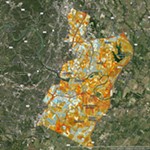Point Austin: Loaded Dice
If we can’t pull together on climate change, we face an unlivable future
By Michael King, Fri., July 27, 2018
If you aren't too hot to read, this is probably a good moment to contemplate some research compiled by Texas Tech climate scientist Katharine Hayhoe for the city of Austin. Apparently, we'll be around 100 degrees all week, perhaps dropping all the way to 97 by Monday. It's Texas, and it's summertime, and it's hardly the first time that we've been baked for a week or two in July. Nevertheless, when stepping outside at midday feels like combat, while you're hiding in the A/C, take a few moments to ponder the future.
Hayhoe's paper ("Climate Change Projections for the City of Austin") is from four years ago, so should she update this work her conclusions would become a bit more specific. But her summation, with rough projections over the coming decades, is daunting enough.
"Summer temperatures are expected to increase, and days where maximum temperature exceeds 100°F and 110°F become more common. Nighttime temperatures that drop below freezing are projected to become increasingly more rare, while nighttime temperatures above 80°F will become more common. ... Heavy precipitation, measured in terms of days per year with more than 2 inches of rain ... is expected to increase. ... For both temperature and precipitation, the changes reported here are consistent with those projected to occur throughout the Southern Great Plains region in response to human-induced climate change." Something to look forward to, I guess.
Recently on Twitter, Hayhoe noted what we can expect in the shorter term. "Cold and hot, wet and dry – we experience natural climate variability all the time. But today, climate change is loading the dice against us, making certain types of extremes, especially heat and heavy precipitation, more frequent and more severe." This summer is quite hot enough – we can expect most summers upcoming to be just a little hotter ...
No Help Elsewhere
Hotter summers in Texas we can learn to bear, but then there are the more devastating storms (as embodied in Hurricane Harvey), followed by economic devastation, lower agricultural yields, species extinction .... Last year a study in the journal Science noted that southern states (Florida, Arizona, Texas) could be especially hard hit. "The worst-hit counties – mainly in states that already have warm climates, such as Arizona or Texas – could see losses worth 10 to 20 percent of G.D.P. or more if emissions continue to rise unchecked." ("As Climate Changes, Southern States Will Suffer More Than Others," The New York Times, June 29, 2017.)
These projections are no longer news, but they would certainly be easier to confront if we lived under state or federal governments even willing to acknowledge the bare, scientific facts. Instead, we live under a national political party dedicated to the propositions that there is no such thing as global warming, and we should empower fossil fuel monopolies and related industries to do everything they can to make it worse.
It's on Us
Unlike our state and national officials, Austin city government (joining the rest of the civilized world) has at least acknowledged the reality of human-caused global warming, and along with earnest attempts to reduce our carbon emissions (an uphill fight against our simultaneous over-reliance on motor vehicles), has embarked on a "climate resilience" initiative.
As it stands right now, the plan is not overly ambitious. The program released in April ("Climate Resilience Action Plan for City Assets and Operations") initially focuses on city infrastructure, since if that goes unprotected, it can't help anybody else. The recommendations are simple: 1) Strengthen emergency response; 2) Expand staff safety plans; 3) Evaluate and upgrade existing facilities and infrastructure; 4) Future-proof new facilities and infrastructure. All straightforward, and not without real costs – although the alternative – doing nothing – will in the end cost much more.
The first stage is likely to be the easy part. The plan looks forward briefly at broader "community resilience," and notes that climate change is not an even-handed phenomenon. "Climate hazards do not impact everyone equally, but disproportionally affect Austin's most vulnerable communities. Typically residing in the northeast, east and southeast portions of Austin, these communities are already stressed by limited resources, growth pressures, and higher rates of chronic disease. ... These inequities also restrict the ability to adapt to changing climate conditions."
It would certainly be much more reassuring if there were a concerted state and national effort to address global warming, but we don't have the luxury of waiting. I also wish there were a local political consensus to create and pay for a substantial mass transit system, but if wishes were railways .... (Instead, we're likely to spend the next few local campaign months arguing whether permitting fourplexes in Allandale will mark the End of Weird Austin Forever.)
In sum, even while we sweat, we've got to plan for the worst, as we continue to hope for the best, as a united community. As is said in Blood Simple, "What I know about is Texas ... and down here, you're on your own."
This article has been updated to correct the spelling of a name.
Got something to say on the subject? Send a letter to the editor.











